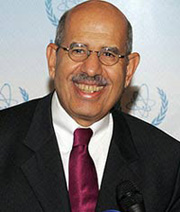 |
| Director General of the International Atomic Energy Agency (IAEA) Mohamed ElBaradei laughs with tears in his eyes while talking to journalists during a press conference.(AFP) |
Mohamed ElBaradei and his International Atomic Energy agency won the 2005 Nobel Peace Prize on Friday, leaving the chief U.N. nuclear inspector strengthened in a job he nearly lost because of a dispute with the United States over Iran and Iraq.
ElBaradei suggested winning the world's most prestigious award vindicated his methods and goals — using diplomacy rather than confrontation and defusing tensions in multilateral negotiations that strive for consensus.
He also suggested the conflict with Washington was over, saying Secretary of State Condoleezza Rice "wished me well" in a congratulatory phone call.
The Bush administration hasbristledat ElBaradei's positions on the nuclear threat posed by Iran and Iraq and unsuccessfully lobbied to block his appointment to a third and final four-year term this year. The endorsement by the Nobel committee was viewed as a major boost to the 63-year-old Egyptian and his mandate to curb nuclear proliferation.
ElBaradei and the IAEA locked horns with Washington in the run-up to the 2003 Iraq war by challenging U.S. claims that Saddam Hussein possessed weapons of mass destruction. More recently, ElBaradei's refusal to back U.S. assertions that Iran has a covert nuclear weapons program hardened opposition to him within the Bush administration.
After the award was announced, ElBaradei refrained from criticizing the United States in comments to Associated Press Television News and two other media outlets.
"I don't see it as a critique of the U.S.," he said Friday. "We had disagreement before the Iraq war, honest disagreement. We could have been wrong, they could have been right."
Instead, he said, the honor was "a message: 'Hey guys, you need to get your act together you need to work together in multinational institutions.'"
The award also was a signal "going to the Arab world, going to the Western world that we ... have a lot in common and we need to work together to survive," ElBaradei said.
(Agencies)
|
